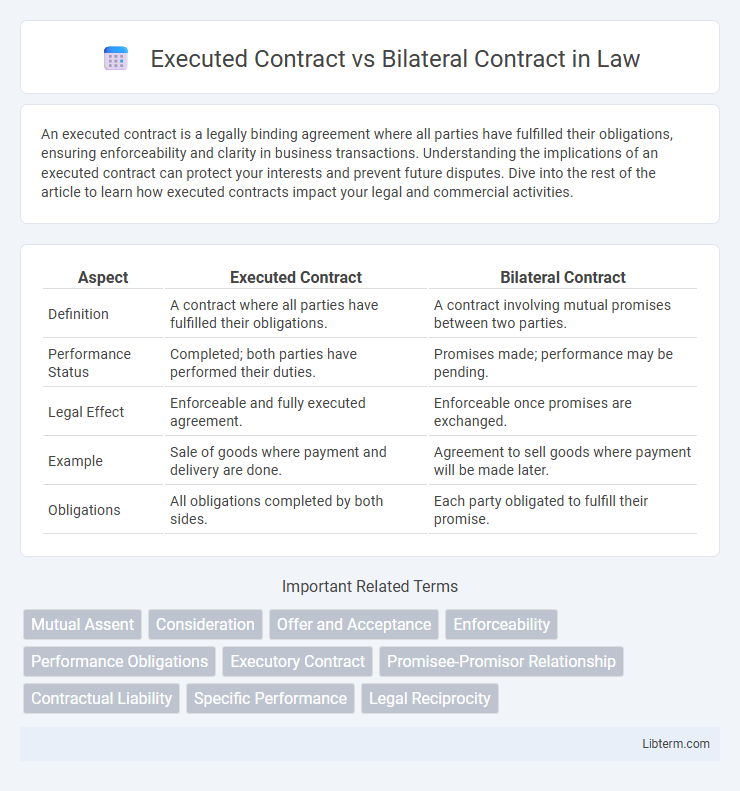An executed contract is a legally binding agreement where all parties have fulfilled their obligations, ensuring enforceability and clarity in business transactions. Understanding the implications of an executed contract can protect your interests and prevent future disputes. Dive into the rest of the article to learn how executed contracts impact your legal and commercial activities.
Table of Comparison
| Aspect | Executed Contract | Bilateral Contract |
|---|---|---|
| Definition | A contract where all parties have fulfilled their obligations. | A contract involving mutual promises between two parties. |
| Performance Status | Completed; both parties have performed their duties. | Promises made; performance may be pending. |
| Legal Effect | Enforceable and fully executed agreement. | Enforceable once promises are exchanged. |
| Example | Sale of goods where payment and delivery are done. | Agreement to sell goods where payment will be made later. |
| Obligations | All obligations completed by both sides. | Each party obligated to fulfill their promise. |
Definition of Executed Contract
An executed contract is a legally binding agreement in which all parties have fully performed their obligations, leaving no outstanding duties under the contract. Unlike a bilateral contract, which involves mutual promises between parties to perform future acts, an executed contract reflects completion and fulfillment of all agreed terms. This distinction is crucial in contract law for determining the enforceability and status of contractual obligations.
Definition of Bilateral Contract
A bilateral contract is a legally binding agreement involving mutual promises between two parties, where each party commits to perform an act in exchange for the other's promise. This contrasts with an executed contract, which is fully performed by both parties, completing all obligations stipulated. Understanding bilateral contracts is essential in contract law, as they form the foundation for most business transactions and enforce reciprocal commitments.
Key Differences Between Executed and Bilateral Contracts
Executed contracts are those in which all parties have fulfilled their contractual obligations, resulting in a completed agreement, whereas bilateral contracts involve mutual promises where both parties commit to future performance. The primary difference lies in timing: executed contracts represent completed performances, while bilateral contracts remain executory until all duties are performed. Understanding these distinctions is crucial in contract law for determining the enforceability and status of agreements.
Legal Implications of Executed Contracts
Executed contracts hold significant legal weight as they represent agreements where all parties have fulfilled their contractual obligations, leaving little room for disputes over performance. The finality of executed contracts often results in enforceability without the need for further action, which contrasts with bilateral contracts that may involve ongoing duties and contingent obligations. Courts typically treat executed contracts as conclusive evidence of terms agreed upon, reducing litigation risks related to non-performance and breach claims.
Legal Implications of Bilateral Contracts
Bilateral contracts, characterized by mutual promises between parties, create immediate legal obligations upon agreement, ensuring enforceability and predictability in transactions. Unlike executed contracts, where performance is completed, bilateral contracts require each party to uphold their promises, making breach consequences integral to contract law. Courts often emphasize intention, offer, acceptance, and consideration in bilateral contracts to determine legal validity and remedies.
Examples of Executed Contracts
Executed contracts are agreements where all parties have fully performed their contractual obligations, such as a paid invoice for delivered goods or a completed home renovation with payment settled. For example, a customer purchasing a car and immediately receiving the title and vehicle is an executed contract. These contracts contrast with bilateral contracts, which involve mutual promises yet to be performed, like a sales agreement where payment and delivery occur at a later date.
Examples of Bilateral Contracts
A bilateral contract involves mutual promises between two parties, such as a homeowner agreeing to pay a contractor for remodeling services. Common examples include employment agreements where both employer and employee exchange promises, or a sales contract where a buyer agrees to pay for goods delivered by the seller. Unlike an executed contract, where all terms have been fulfilled, bilateral contracts are formed when both parties make enforceable commitments upfront.
Rights and Obligations in Each Contract Type
An executed contract is one in which all parties have fully performed their contractual obligations, meaning rights and duties have been completely fulfilled with no remaining actions required. In a bilateral contract, both parties exchange mutual promises, creating reciprocal rights and obligations that are enforceable until each party performs their respective duties. The key distinction lies in the timeline of performance: bilateral contracts establish concurrent rights and obligations, whereas executed contracts signify the completion and satisfaction of those obligations.
When to Use an Executed vs Bilateral Contract
An executed contract is ideal when both parties have fully performed their obligations, ensuring clarity and finality in transactions such as completed sales or services. Bilateral contracts suit ongoing agreements where both parties exchange promises and anticipate future performance, common in employment or lease agreements requiring reciprocal commitments. Choosing between executed and bilateral contracts depends on whether the parties require immediate completion or ongoing mutual exchange of duties.
Importance in Business and Legal Transactions
Executed contracts provide clear evidence of agreed terms and completed obligations, reducing disputes and ensuring enforceability in business and legal transactions. Bilateral contracts establish mutual promises, fostering trust and cooperation by legally binding both parties to their commitments. Understanding the distinctions between these contracts is crucial for effective risk management and protecting legal rights in commercial dealings.
Executed Contract Infographic

 libterm.com
libterm.com